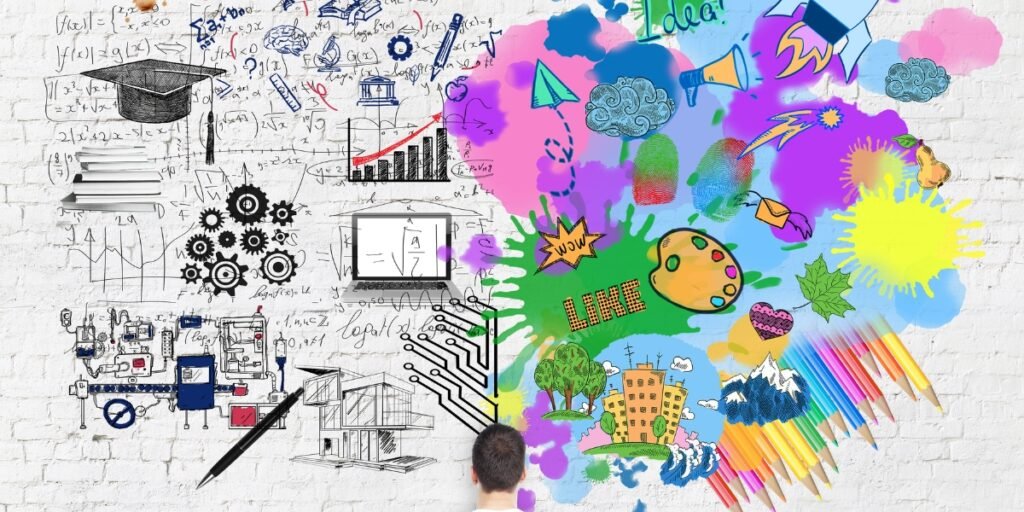In the pursuit of personal growth, creativity often plays a crucial but sometimes underestimated role. While creativity is often associated with artistic endeavors, it extends far beyond painting, writing, or music. Creativity is about thinking outside the box, solving problems, and finding new ways to approach challenges in life. Integrating creativity into your personal development journey can unlock new potential and foster continuous growth.
Creativity Enhances Problem-Solving Skills
Creativity is at the heart of problem-solving. Whether you’re facing professional challenges or personal dilemmas, the ability to think creatively can help you find innovative solutions. By approaching problems from different perspectives, you can uncover options that might not be immediately obvious. This flexibility in thinking is a powerful tool for overcoming obstacles and advancing in both personal and professional areas of life.
Boosts Confidence and Self-Estee
Engaging in creative activities fosters self-expression, which is essential for building confidence and self-esteem. Whether you’re writing, painting, or brainstorming new ideas for a project, expressing yourself creatively helps you connect with your authentic self. This self-connection is crucial for personal development because it helps you understand who you are and what you’re capable of.
Fosters Emotional Well-Being
Creativity is a powerful outlet for processing and expressing emotions. It allows you to channel complex feelings into productive activities, whether through art, writing, or other forms of creative expression. This process not only helps you manage stress but also contributes to emotional balance and well-being.
Encourages Lifelong Learning
One of the core components of personal development is the commitment to continuous learning. Creativity fuels this process by sparking curiosity and encouraging exploration. When you embrace creative thinking, you’re more likely to seek out new experiences, try different approaches, and push the boundaries of what you know.
Strengthens Adaptability and Flexibility
In an ever-changing world, adaptability is a key skill. Creativity plays a significant role in helping you become more flexible in both your personal and professional life. By cultivating creative thinking, you’re better equipped to handle change, adapt to new situations, and stay ahead of challenges. Creative individuals are often more open to change and willing to explore alternative ways of achieving their goals.
Helps Set and Achieve Personal Goals
Creativity is not just about coming up with ideas but also about executing them. When you apply creative thinking to your goal-setting process, you’re more likely to develop innovative and achievable plans. Creative problem-solving helps you break down larger goals into manageable steps, and it allows you to pivot when needed without losing sight of your ultimate objectives.
Promotes Mindfulness and Presence
Engaging in creative activities often requires you to be fully present and focused, which promotes mindfulness. Whether you’re painting, writing, or simply brainstorming, creativity pulls you into the present moment, allowing you to experience a sense of flow. This state of flow, where you’re deeply absorbed in the task at hand, is a powerful way to develop mindfulness.
Conclusion
Creativity is a vital element in personal development, shaping how you approach challenges, express yourself, and adapt to change. By embracing creativity, you enhance your problem-solving abilities, boost your confidence, and promote emotional well-being. Moreover, creativity fuels lifelong learning, strengthens adaptability, and helps you achieve personal goals. Whether through art, writing, or simply thinking outside the box, incorporating creativity into your daily life can significantly accelerate your personal growth journey.
Frequently Asked Questions (FAQ)
What is creativity in the context of personal development?
Creativity in personal development refers to the ability to think differently, explore new ideas, and approach challenges in innovative ways. It’s not limited to artistic expression but encompasses problem-solving, adaptability, and self-expression in all aspects of life.
How does creativity improve problem-solving skills?
Creativity allows you to approach problems from different angles and think outside traditional solutions. By encouraging flexible thinking, creativity helps you come up with innovative ways to overcome obstacles, making problem-solving more effective.
Can creativity help me build self-confidence?
Yes, engaging in creative activities allows for self-expression and experimentation, which fosters confidence. The more you express your ideas and achieve small successes through creativity, the more self-assured you become in your abilities.
How can creativity impact my emotional well-being?
Creativity provides an outlet for processing emotions. Whether through writing, painting, or any creative activity, it helps release stress, manage emotions, and contribute to emotional balance, improving overall mental health.
Is creativity important for lifelong learning?
Absolutely. Creativity sparks curiosity and encourages you to explore new topics, learn new skills, and adapt to changing situations. It keeps your mind engaged and open to continuous growth and learning.
How does creativity enhance adaptability?
Creative thinking enables you to be more flexible and open to change. By cultivating a creative mindset, you’re better equipped to adjust to new situations, challenges, and opportunities, which is essential for personal and professional growth.
Can creativity help with setting and achieving personal goals?
Yes, creativity allows you to approach goal-setting in innovative ways. It helps break down goals into manageable steps, keeps you motivated through fresh ideas, and enables you to adapt your approach when needed, ensuring long-term success.
How can creativity contribute to mindfulness?
Creative activities often require focus and being present in the moment, promoting mindfulness. When you are deeply engaged in a creative task, you experience a state of flow that enhances concentration, reduces stress, and improves emotional well-being.
Do I need to be an artist to be creative?
No, creativity is not limited to the arts. Everyone has the capacity to be creative in their own way, whether through problem-solving, brainstorming new ideas, or finding unique solutions in daily life.
How can I nurture my creativity?
You can nurture creativity by trying new experiences, challenging yourself to think differently, exploring hobbies, and embracing opportunities for self-expression. Stay open-minded and curious, and allow yourself the freedom to experiment without fear of failure.
